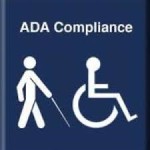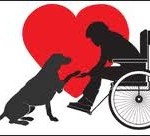You have probably heard about service dogs, or maybe you have seen them on airplanes or in restaurants, and you might say to yourself, “Why on earth is that man or woman allowed to bring that dog in here.” Perhaps you don’t want to eat dinner in a restaurant where a large dog is tucked under the seat of its owner or walking past you on the way to a table. Maybe you think a service dog will bark on the plane or even bite someone.
I can almost guarantee you that, if it is a real service dog, it will not bother you at all, as long as you are not bothering its handler. A service dog will not bark, bite, or jump on you. Most of the time, you probably will not even realize that the animal is there because service dogs are highly trained, specialized animals. The same is not always true of a companion dog.
A service dog is “. . . individually trained to do work or perform tasks for an individual with a disability. The task(s) performed by the dog must be directly related to the person’s disability (Americans with Disabilities Act (ADA, 2010).” Please note the heavy emphasis on the word “trained.”
Dogs, such as seizure assistance alert dogs, guide dogs for the blind, or service dogs for people with physical disabilities, such as cerebral palsy, can dramatically affect the disabled person’s life “ . . .but only if the dog is trained well enough to assist. A dog who is not trained will only make a situation worse,” states Katie Gonzalez, CDT, director of Little Angels Service Dogs and author of several books about training assistance dogs.”
I have wanted a service dog for at least ten years. I have purposely waited to apply for a dog because of the great responsibility that comes with having such a dog—responsibility that extends to family, friends, society, and the dog. I have written a long list of pros and cons about having a service dog; I have edited the list many times, and still, I have not made up my mind about getting one; it is a serious matter. Yet, I know people who decide on a whim to obtain a dog for emotional companionship or for some other reason. Then they go on-line, buy a vest for it, and proceed to call it a service or companion dog, thinking that they have the right to take the dog with them anywhere, no matter how this most likely untrained animal may affect other people. Currently, almost anyone can have such a dog. Laws are changing to accommodate “invisible” handicaps.
I am not against a truly handicapped person from having a service or “companion” dog, but there should be strict regulations accompanying such privileges. For instance, real service dogs undergo extensive training at great cost and time. They are first trained by experts to behave impeccably; they do not bark, except for specific reasons, such as the need to alert others to assist their handler in the event of a seizure. They do not run around or chase other dogs. They know their job is to work for and to assist their handler. These dogs will not even go to the bathroom without permission. They can be taught to go in specific places. After the initial training by an agency, the service dog then trains further with its intended owner or handler. By the time training is complete, the dog will know many signals and commands, which will enable him or her to assist with the specific needs of the disabled person. The ADA provides handicapped people with the privilege of taking their highly trained dog with them to various places in exchange for the understanding that the dog will not disrupt the public since other people also have rights to enjoy their day safely and without harassment.
I have friends and family who have companion dogs. I believe that they derive great comfort from their dogs. However, I have witnessed and heard accounts from trustworthy sources who have seen these cute little doggies walking on tables where food is served, running around, barking excessively, chasing other dogs, and even peeing on a restaurant floor. I’m sorry, folks; this is not right. Real service dogs are trained not to do these things, which can be unpleasant or disruptive to other people. An untrained dog can even be potentially dangerous in some places, such as an airplane.
If people with invisible handicaps want a “companion” dog, they should be required to have training comparable to actual service dogs. Otherwise, the dog is simply a pet wearing a vest. This is unfair to the public, and it is particularly unfair to people with disabilities who apply for, wait for, pay for, and train real service dogs.
Don’t we all get comfort from our pets, and wouldn’t we all like to take our pets with us wherever we go? People who want this privilege must first comply with acceptable standards.
I need a service dog to assist me with many things such as opening doors, turning on lights, bringing things to me that I cannot possibly reach, picking up things that I continually drop, finding my way home, alerting my family in the event of a seizure, helping me to stand up if I have fallen, reminding me to take medications, pulling my wheel chair, and much, much more; the list is extensive. I have been disabled since birth and still am not independent despite years of physical and occupational therapy. A service dog could save my life, and yes, it would provide me with companionship in this sometimes lonely life.
If I do decide to apply for a service dog, I am very aware of my responsibility to the people of the world, and I solemnly promise that I will not deprive them of their right to a safe and serene environment because of my wants and needs.
I encourage others to think about this situation and the way that the ADA laws have been misused in order to accommodate the wants of certain people who do not take on the responsibilities that go with the privilege. Think about it and encourage everyone you know to practice socially appropriate behavioral etiquette for companion animals.












Wow, it hadn’t even occurred to me that there could be fake service digs out there. This was beautifully written, Jaime, and very enlightening. Thank you.
Thanks, Lalchumi! I appreciate that you read and comment on my blog. The fake service dogs are a big problem, like those who fake handicaps at Disneyland and Sea World, ruining it for those of us who are handicapped. Thanks again!
That was “dogs” ☺
Well said, Jaime! I had a friend that was blind, and he had a service dog that brought him the independence that he needed! Quite the team they were!
Your mother is a friend of mine that I met many years ago. I visited her school, and then our classes became pen pals. We have stayed in contact ever since. My name is Kathy South, a retired teacher from Hill City, Minnesota. I currently live in Grand Rapids, Minnesota. I have read other posts that you have written, but this is the first time I have left a comment.
Thank you so much, Kathy! I appreciate that you follow my blog and now that you have left a comment. The comments are the only way that I know someone is reading. Thanks for reading and sharing! Yes, my mom has mentioned you to me in the past. Take care.
Totally agree Jaime. Living in Palm Springs we see way too many so called “service dogs” in restaurants, casinos, theater, everywhere, and not laying by the owner’s feet. Sitting in a chair in a restaurant, being fed by its owner. All because the dog is wearing a vest.
I do believe that a well trained “service dog” is invaluable for those that have true handicaps. And believe it is something you should consider.
Thank you, Stephanie! I do want a service dog so much. It is my biggest dream. Thank you for your encouragement and support. It is a hard decision to make since most of my family members are not on board with it, and I have to admit this in the application, which would pretty much guarantee that they will not give me one. My mom is with me on it. Thanks again!
Very good blog post! I know it is an issue that is very close to your heart and it is important for people to read about it from your perspective.
Thank you for your comment, Mindy! Your opinion means lots to me!
Again, very well written & I agree 100% with your position. I have dogs & like you said would love to take them with me and even though they wouldn’t be running around there are places they do not belong. I can’t tell you how many times I’ve been at the mall and someone will have the dog on a leash with the vest wandering through the store-Pottery Barn-and there’s the dog sniffing the blankets or pillows like they’re at Petco–drives me nuts! Or you see one with a vest and that dog is clearly not service trained. “You can get the vest on line” one woman told me when I asked her about her “trained’ dog–totally missing my sarcasm. Anyway, you are right-something should be done about this abuse of a necessary and in many cases life saving issue. Keep up speaking out–you are a great voice for these issues.
Thanks, Lynn! I think about what I am going to write about for a long time before it becomes a blog because I want it to be meaningful. Please keep reading, sharing, and commenting.
wow very good points and very true we see dogs everywhere now and not for service purposes
Thank you, Ben! I love that you follow my blogs!
Jamie, Thanks for all the info about service dogs, and I learned things I didn’t know, especially what they do for each person. I agree with you about companion dogs, and I see them everywhere, even in the grocery store the other day. I am an animal lover, and have had many dogs over my lifetime, ( I went to High School with your Mom), and I have a dog and 3 cats now. But Dogs are dogs. I hope you decide to get a service dog. How close are you to getting one? I loved your blog and please send it to my e-mail address.
Have a great week,
Liz
Thanks, Liz. I will send it to your email. Thanks for reading, and especially thanks for commenting. That is how I know that someone is reading and what they think about it. Take care.
I think the little doggie at the end needs a home!
Seriously though, nice job on this one, Jaime!
Thank you, Jeffie!
I have read it over and over again, and still want to read it again. It is a concise, fast read, and the no one could argue with the logic of the message. Good job!
Thanks, Mom. Keep reading and editing. Can’t do it without you!
I’m glad you wrote this. Years ago a neighbor of mine had a service dog for stress, she was everything to her. I think you would really benefit from having a service dog also. I hope one day you can have one.
Thanks, Olivia! I appreciate your following my blog. Please continue to share with friends. Hope all is well with you. We need to catch up.
Just got around to reading this one, Jaime. Although we have talked together about this many times, seeing it all in writing is very enlightening.
I have life-threatening allergies and my service animal alerts me to changes in my respiratory system so I can leave the environment and quickly use my medications, hopefully preventing anaphylaxic shock. I am one of those persons that you would not know has a disability just by looking at me, an “invisible disability”, however, without my service dog I would be homebound.
Your article is informative and does speak to the need for people to stop pretending their pets are service animals, however, I was disappointed to read “If people with invisible handicaps want a “companion” dog, they should be required to have training comparable to actual service dogs.”
Some people have disabilities such as diabetes, seizures, severe allergies, autism, etc that some classify as “invisible”. This term is discriminating in nature and lends to the discrimination many of us endure on a daily basis. Just because our disability is not physically apparent does not mean that we don’t need a service animal.
I have found that not only does my service animal assist me with notifying me of exposure to deadly allergens, but she also alerts others if I am having respiratory compromise or have quit breathing. On her vest is a label that identifies her as an allergy service dog which alerts bystanders that should I be compromised what treatment is required. She has saved my life numerous times in the past 5 years.
Another error in your article is that service dogs do not have to be professionally trained. Owners are allowed to train their own dog but the animal must be trained to meet the ADA guidelines for service animals. Not everyone is capable of training a service animal, and that is where the agencies come into play. However, the agencies have driven the cost of a service animal out of the reach of most disabled persons.
What I have seen in the past 12 years that I have been working service dogs is that those in public establishments with pets impersonating service animals do not have “invisible” disabilities but are persons with manageable health conditions who want to have their pets with them at all times. They are not disabled under the ADA guidelines but are pretending to be in order to receive what they consider to be special priveledges. They do not realize that being disabled is NOT fun. They do not realize how insulting it is to not be disabled and pretend to be in order to have their pet in the grocery store sitting in the cart. They do not realize that their badly behaving animals cause establishments to be discriminatory to those of us who need a service animal. They do not realize that their out of control animal who is barking, growling, and lunging at my animal interferes with her ability to do her job. They do not realize that when their dog attacks &/or bites my dog that she will not be able to work until she is healed and the fear that results may prevent her from being able to go back to work.
I encourage you to get a service dog. The dog will bring you freedoms that you never knew that you could have. Wishing you well.
Dear JD Windle:
You are absolutely correct with all of your comments. I apologize for any loosely written assertions. I do know that many people have “invisible” handicaps, such as yours and others. I was referring to those individuals whose “invisible” handicaps do not require the use of a service dog,and who merely desire to keep their pets with them for “comfort.” I feel the way regarding people I see parking in accessible parking as I observe them jumping out of their car without any physical disability while my family parks in the last spot, unable to get my wheelchair out of the car for lack of space. I am speaking of those people who take advantage of the system and make it more difficult for those who need these advantages. You have stated the case much better than I did regarding the lack of realization of these people who simply want to have their pets with them. But what you have stated is exactly my point.
I also did not mean to say that service dogs are not required to be trained. They should be trained. I have researched the training of service dogs and appreciate the professional behavior of these dogs who do not bark, whine, lunge, or otherwise interfere with public rights and especially the safety of other service dogs. I am young and appreciate your helpful comments which I will definitely take into consideration with future articles. I do believe that the law should be strict regarding impersonations of actual service dogs. I for one would not mind showing proof of my disability should a person question me. Thank you for reading. Take care.